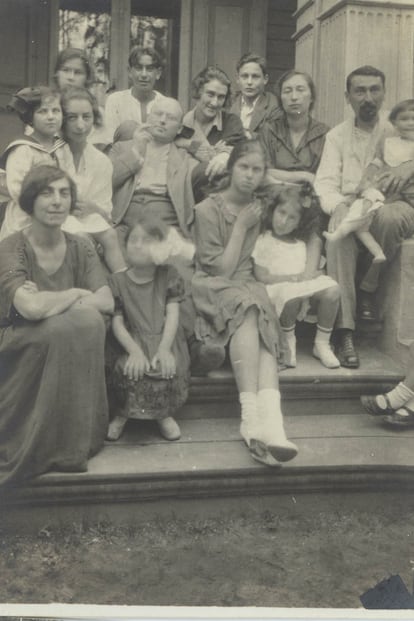A mysterious card delivered in the mail inspires French best-seller, ‘The Postcard’
Writer Anne Berest reconnects with her Jewish identity by delving into the lives of ancestors executed in Auschwitz


Anne Berest was 24 years old in 2003 when her mother received an unsigned postcard at her home in the Paris suburbs. On the front was a picture of the Palais Garnier, home of the Paris Opera. On the back were the names of Anne Berest’s maternal great-grandparents – Ephraïm and Emma – and two of their children, Noémie and Jaqcques. The four had died in Auschwitz in 1942, victims of the Holocaust. Berest told EL PAÍS that the family was shocked to receive the postcard, and a little frightened. “There was something very terrible about the postcard, so we put it in a drawer and forgot about it for 15 years,” she said.
In The Postcard, Berest embarks on a journey to trace her family’s unknown history through an investigation of the mysterious postcard. Written like a detective novel, Berest and her mother enlisted the help of a private detective and a criminologist to solve the puzzle. But unlike a mystery writer who imagines and creates the whole story, Berest had no idea how this one would end. It took four years to identify the postcard’s sender, a secret that’s finally revealed at the end of the book. “Real life gave me a lesson in writing,” said Berest.
- Why did you decide to investigate the postcard 15 years later?
“In 2018, my six-year-old daughter came to my regular Wednesday lunch with my mother and asked, ‘Grandma, are we Jewish?’ When my mother said yes, my daughter got a worried look on her face. ‘It’s just that they don’t like Jews very much at school.’ My mother later said I should talk to my daughter about this, but I couldn’t face it right away. Instead, I remembered the postcard and suddenly became obsessed with identifying the sender.”

Berest calls her book “a true novel” because it tells her family’s real-life story. It begins with her great-grandparents – the Rabinovitches – who fled pre-revolutionary Russia with their first child Myriam, (the author’s grandmother), an infant at the time. The family lived near Moscow, and one day Nachman Rabinovitch, Ephraïm’s father and the family patriarch, gathered everyone together and said they had to leave, that Jews were not welcome in Russia anymore. “Listen carefully, my children. It stinks of shit here,” he told them in Yiddish.
Nachman’s warning is a recurring theme throughout the story, one that comes back to haunt Berest when she hears about her daughter’s experience at school and the principal’s dismissive attitude. She writes with astonishment about the revisionism and denial in France, which surfaced publicly in September 2021 when a new far-right politician named Éric Zémmour had the gall to say that Marshal Pétain (the head of the Vichy regime that collaborated with the Nazis in occupied France) had tried to save the Jews and never aided their deportation to death camps.
- Does France smell like shit these days?
“I don’t know, but I can tell you that it doesn’t smell good. I am quite pessimistic. There are anti-Semitic and racist acts every day in France. I believe that the years ahead will be tough for the economy, and the Jewish community has always been the scapegoat in these circumstances. But we’re not the only ones – immigrants will become scapegoats as well. Preserving the collective memory is a fragile process, and wasn’t publicly acknowledged until 1995 when President Jacques Chirac made an official apology [for the French state’s complicit role in the deportation and extermination of Jews]. We need to strengthen this collective memory.”

After brief stops in Latvia, Poland, and Palestine, Emma and Ephraïm Rabinovitch settled in Paris with their three children. But as World War II approached, Nachman’s ominous warning began to resonate again – the rights of Jews were curtailed, and their property confiscated. One day, the Nazis took the two youngest children, Jacques and Noémie. Then Ephraïm and Emma were taken. Their oldest child, Myriam, was spared because she had married a year earlier.
Berest’s autobiographical novel solves the mystery of the postcard and explores a nagging doubt of her own – what does it mean to be a Jew if you’ve never set foot in a synagogue or observed the Sabbath? The second part of Berest’s book bears the title, “Memories of a Jewish Girl Without a Synagogue.” Berest recalls times in her life when she heard the word “Jew,” and how she quietly came to know that she belonged to this community even though no one said so out loud. “To be Jewish is to spend your life wondering what that means,” jokes Berest. “But I explain all this in the book.”

In one of the novel’s lighter moments, Anne is having lunch with her friend Gérard, who is also Jewish. He remembers going to parties with his parents when he was little and noticing that the older people had numbers tattooed on their arms. When he asked his mother about it, she lied. “They’re phone numbers. Since they’re old, they get them tattooed so they don’t forget.” Berest writes that while talking about the Holocaust is no longer taboo, it took time for Jewish families to come to terms with it. “My grandmother Myriam never said a word about it. The trauma of the war silenced most of the victims – they were afraid it would happen again. Many changed their surnames, like Gérard’s family did in the 1960s.”
Sign up for our weekly newsletter to get more English-language news coverage from EL PAÍS USA Edition
Tu suscripción se está usando en otro dispositivo
¿Quieres añadir otro usuario a tu suscripción?
Si continúas leyendo en este dispositivo, no se podrá leer en el otro.
FlechaTu suscripción se está usando en otro dispositivo y solo puedes acceder a EL PAÍS desde un dispositivo a la vez.
Si quieres compartir tu cuenta, cambia tu suscripción a la modalidad Premium, así podrás añadir otro usuario. Cada uno accederá con su propia cuenta de email, lo que os permitirá personalizar vuestra experiencia en EL PAÍS.
¿Tienes una suscripción de empresa? Accede aquí para contratar más cuentas.
En el caso de no saber quién está usando tu cuenta, te recomendamos cambiar tu contraseña aquí.
Si decides continuar compartiendo tu cuenta, este mensaje se mostrará en tu dispositivo y en el de la otra persona que está usando tu cuenta de forma indefinida, afectando a tu experiencia de lectura. Puedes consultar aquí los términos y condiciones de la suscripción digital.








































